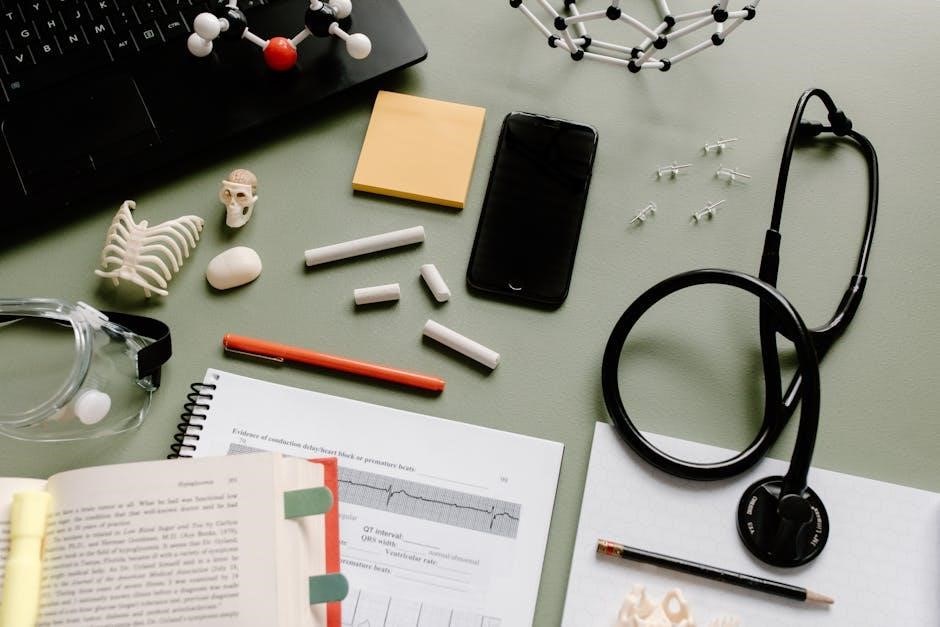Nursing study guide books provide comprehensive resources for students, covering foundational concepts, clinical skills, and exam preparation. They offer structured learning, essential for mastering nursing principles and excelling in exams.
1.1 Importance of Nursing Study Guides for Students
Nursing study guides are invaluable for students, offering structured learning and essential insights. They simplify complex concepts, making them easier to understand and retain. These guides also provide practice questions and test-taking strategies, helping students prepare for exams like the NCLEX-RN. By organizing information effectively, study guides enable students to focus on key areas, build confidence, and develop a strong foundation for their nursing careers. They are indispensable tools for achieving academic success and clinical competence.
1.2 Key Features of a Comprehensive Nursing Study Guide
A comprehensive nursing study guide typically includes detailed practice questions, test-taking strategies, and condensed content for efficient learning. Many guides feature full-color illustrations, interactive elements, and organized indexes for easy navigation. They often cover essential topics like pharmacology, anatomy, and health assessment, while also providing rationales for answers. Some guides, such as the Saunders NCLEX Comprehensive Review, include over 4,500 exam-style questions, making them invaluable for exam preparation. These tools are designed to simplify complex nursing concepts and enhance retention.

Core Nursing Subjects Covered in Study Guides
Nursing study guides cover essential subjects like pharmacology, anatomy, health assessment, and evidence-based practice, providing structured learning for mastering complex nursing concepts and clinical skills effectively.
2.1 Fundamentals of Nursing Practice
Fundamentals of nursing practice include essential skills such as patient assessment, infection control, and medication administration. Study guides emphasize these core concepts, ensuring students master safe and effective care practices. Topics like vital signs, wound care, and patient mobility are covered in detail, providing a solid foundation for clinical practice. These guides also highlight the importance of communication, documentation, and ethical considerations in daily nursing tasks, preparing students for real-world scenarios and building confidence in their abilities.
2.2 Anatomy and Physiology Basics
Anatomy and physiology form the cornerstone of nursing education, providing insights into the human body’s structure and function. Nursing study guides dedicated to this topic explore body systems, from the cardiovascular to the nervous system. They explain cellular processes, homeostasis, and how the body responds to health and disease. Visual aids like diagrams and charts help students grasp complex concepts. Understanding these basics enables nurses to identify abnormalities, interpret assessments, and provide effective care, making it a critical foundation for clinical practice and patient safety.
2.3 Pharmacology and Medication Administration
2.3 Pharmacology and Medicology Administration
Pharmacology and medication administration are vital components of nursing practice, focusing on drug classifications, dosages, and interactions. Nursing study guides detail how to safely administer medications, emphasizing routes of administration and potential side effects. They also cover pharmacokinetics, pharmacodynamics, and patient-specific factors influencing drug responses. Understanding these principles ensures accurate medication delivery, minimizes errors, and enhances patient safety. These guides often include drug tables and case studies to reinforce learning and clinical application.
2.4 Health Assessment and Diagnostic Techniques
Nursing study guides emphasize the importance of health assessment and diagnostic techniques, providing detailed guidance on performing physical examinations and interpreting findings. They cover essential skills such as documenting patient history, assessing vital signs, and identifying abnormalities. These resources also include tips for accurately interpreting diagnostic tests like lab results and imaging studies. By mastering these techniques, nurses can deliver personalized, evidence-based care, ensuring timely and accurate diagnoses for optimal patient outcomes.

NCLEX-RN Exam Preparation
Nursing study guides offer comprehensive NCLEX-RN exam preparation, featuring practice questions, test-taking strategies, and detailed rationales to help students master nursing content and excel on the exam.
3.1 Best NCLEX-RN Review Books
The best NCLEX-RN review books include the Saunders Comprehensive Review, ATI TEAS Study Guide, and Kaplan Nursing School Prep. These resources provide condensed nursing content, practice questions, and test-taking strategies. Saunders is particularly praised for its 4,500+ exam-style questions and detailed rationales. ATI TEAS is ideal for nursing school admission, while Kaplan offers interactive tools for targeted preparation. These books are essential for understanding key concepts and excelling on the NCLEX-RN exam, ensuring nursing students are well-prepared for success.
3.2 Practice Questions and Test-Taking Strategies
Practice questions and test-taking strategies are crucial for NCLEX-RN success. Saunders Comprehensive Review offers over 4,500 exam-style questions with detailed rationales, helping students master content. Effective strategies include prioritizing high-weight topics, managing time, and understanding question formats. These resources build confidence and improve critical thinking, ensuring nursing students are well-prepared to tackle the exam effectively and achieve their goals.
3.3 Saunders NCLEX Comprehensive Review
The Saunders NCLEX Comprehensive Review is a top choice for nursing students, offering over 4,500 exam-style questions with detailed rationales. It covers all nursing content areas, providing test-taking tips and strategies to enhance understanding. The book’s organized format and full-color design make it easy to navigate. Trusted by many, it’s an excellent resource for mastering the NCLEX-RN exam, ensuring students are well-prepared to succeed and achieve their nursing career goals effectively.

Nursing School Study Strategies
Effective note-taking, time management, and active learning are essential for nursing students. Interactive guides and structured resources help master complex concepts, ensuring success in exams and clinical settings.
4.1 Effective Note-Taking Techniques
Effective note-taking is crucial for nursing students to retain complex information. Techniques like the Cornell Method and mind mapping help organize content efficiently. Nursing study guides often provide structured templates and tips for summarizing key concepts. Highlighting important terms and reviewing notes regularly enhances retention. These strategies ensure students can quickly reference critical information, making study sessions more productive and exam preparation smoother.
4.2 Time Management for Nursing Students
Effective time management is essential for nursing students to balance rigorous coursework, clinical rotations, and personal life. Nursing study guides often include tips for creating structured schedules, prioritizing tasks, and avoiding procrastination. Techniques like breaking study sessions into shorter intervals and using planners or digital tools can enhance productivity. By managing time wisely, students can reduce stress, stay organized, and perform better academically, ensuring they are well-prepared for exams and clinical demands.
4.3 Active Learning Methods for Nursing Concepts
Active learning engages nursing students through interactive methods like group discussions, simulations, and hands-on activities. Study guides often include case studies, concept maps, and practice scenarios to reinforce learning. Techniques like flipped classrooms and problem-based learning encourage critical thinking. Interactive tools, such as SimpleNursing modules, provide dynamic ways to grasp complex concepts. By applying knowledge in real-world contexts, students develop a deeper understanding and improve retention of nursing principles, preparing them for clinical practice and exams.

Recommended Nursing Study Resources
Top resources include ATI TEAS Study Guide, Kaplan prep tools, and SimpleNursing guides, offering practice questions, interactive modules, and comprehensive reviews to enhance nursing education and exam success.
5.1 ATI TEAS Study Guide for Nursing School Admission
The ATI TEAS Study Guide is a top choice for nursing school admission, offering comprehensive practice questions and reviews for the Test of Essential Academic Skills. Designed to help students excel in reading, math, science, and English, it provides detailed rationales and test-taking strategies; This guide is ideal for applicants seeking to improve their scores and gain confidence. Its structured format ensures focused learning, making it a trusted resource for aspiring nurses.
5.2 Kaplan Nursing School Prep Tools
Kaplan Nursing School Prep Tools offer comprehensive resources for students, including practice questions, interactive learning modules, and detailed study guides. These tools are designed to help students excel in both the NCLEX-RN exam and nursing school coursework. Kaplan’s structured approach ensures focused learning, covering essential topics like pharmacology, anatomy, and health assessment. Their resources are known for boosting confidence and improving test-taking strategies, making them a valuable asset for nursing students aiming to succeed.
5.3 SimpleNursing Interactive Study Guides
SimpleNursing Interactive Study Guides are renowned for their engaging and user-friendly approach to learning. These guides feature interactive modules, practice questions, and video tutorials, making complex nursing concepts easier to grasp; They cover key areas like pharmacology, health assessment, and clinical skills, with clear explanations and visual aids. The guides are designed to enhance retention and understanding, offering students a flexible and efficient way to study. Trusted by thousands, SimpleNursing tools are a top choice for nursing students seeking interactive and effective learning resources.

Clinical Skills and Hands-On Training
Clinical skills and hands-on training are vital for nursing students, enabling them to apply theoretical knowledge in real-world settings. Essential procedures, diagnostic techniques, and patient care are emphasized.
6.1 Essential Nursing Procedures and Protocols
Essential nursing procedures and protocols are critical for delivering safe and effective patient care. Study guides detail step-by-step instructions for vital signs, medication administration, wound care, and infection control. They emphasize adherence to evidence-based practices, ensuring nurses understand proper techniques and safety measures. These resources also cover emergency protocols and diagnostic procedures, preparing students for real-world clinical scenarios. Mastery of these skills is fundamental for building confidence and competence in nursing practice.
6.2 Clinical Pocket Guides for Nurses
Clinical pocket guides are indispensable tools for nurses, offering quick access to essential information. These portable resources cover medication dosages, infection control, and emergency protocols. Designed for on-the-go use, they provide concise, evidence-based guidance. Many include comprehensive indexes for easy navigation. Popular among nursing students and professionals, they enhance clinical decision-making and ensure adherence to best practices. Their compact format makes them ideal for bedside reference, supporting nurses in delivering high-quality patient care efficiently.

Evidence-Based Nursing Practice
Evidence-based nursing practice integrates research findings into clinical care, ensuring decisions are grounded in scientific evidence. This approach enhances patient outcomes and maintains high standards of care.
7.1 Defining Evidence-Based Practice in Nursing
Evidence-based practice (EBP) in nursing combines research evidence, clinical expertise, and patient values to guide decision-making. It emphasizes using the best available evidence to improve patient outcomes and reduce care variability. EBP involves a systematic approach to identifying and applying credible research findings, ensuring nursing interventions are safe, effective, and patient-centered. This approach fosters a culture of continuous improvement and accountability in healthcare settings, ultimately enhancing the quality of care provided by nursing professionals.
7.2 Implementing Research in Clinical Settings
Implementing research in clinical settings involves translating evidence-based findings into practical nursing care. Nurses use systematic approaches to identify credible research, assess its relevance, and apply it to patient care. This process ensures care is grounded in the latest evidence, improving patient outcomes. Regular updates to protocols and continuous staff training are essential for successful implementation. By integrating research, nurses contribute to safer, more effective, and patient-centered care, fostering a culture of excellence in healthcare delivery.
Nursing study guides empower students to excel by providing structured learning and essential skills. Stay motivated, build a strong foundation, and use effective study strategies for a successful nursing career.
8.1 Staying Motivated Throughout Nursing School
Staying motivated in nursing school requires setting clear goals, celebrating small achievements, and embracing challenges as growth opportunities. Utilize study guides like Saunders NCLEX and ATI TEAS to stay focused. Building a support network with peers and mentors can also boost morale. Prioritize self-care and maintain a balanced routine to avoid burnout. Remember, persistence and determination are key to overcoming obstacles and achieving success in your nursing journey. Stay committed to your aspirations and continuously seek ways to enhance your learning experience.
8.2 Building a Strong Foundation for a Nursing Career
Building a strong foundation for a nursing career begins with mastering fundamental concepts and clinical skills. Utilize study guides like Saunders NCLEX and ATI TEAS to reinforce learning. Develop critical thinking, time management, and effective study habits. Prioritize hands-on training and evidence-based practices to enhance competence. Cultivate strong communication skills and empathy to provide quality patient care. By combining academic excellence with practical experience, you’ll establish a robust foundation for long-term success in the nursing profession.




